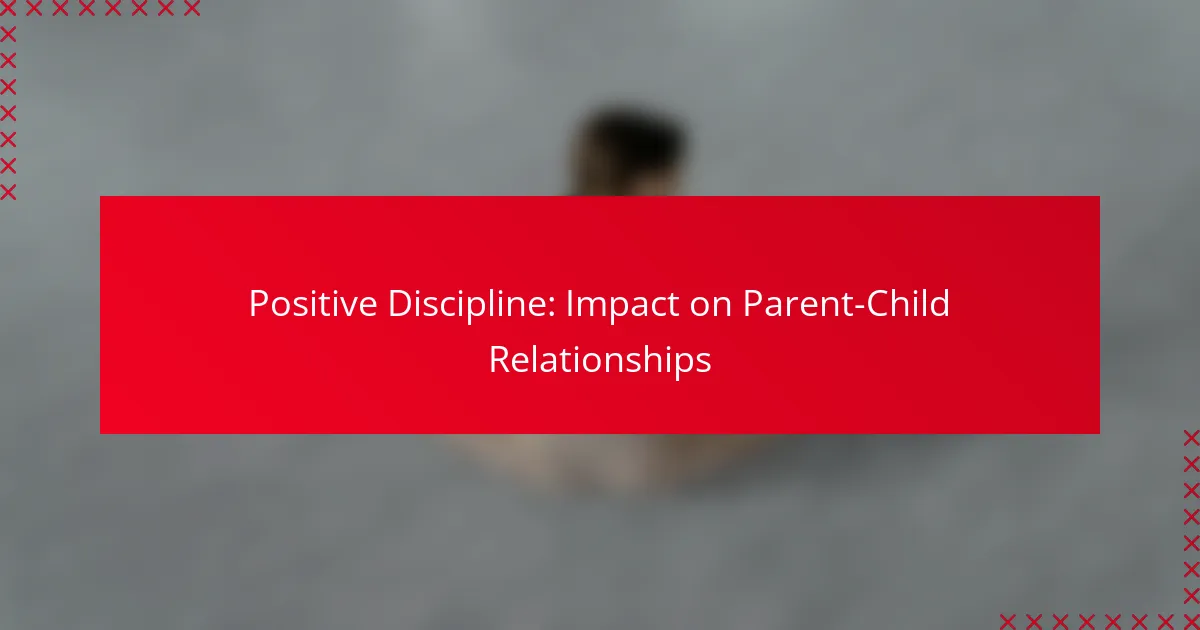Positive Discipline significantly enhances parent-child relationships by promoting empathy, understanding, and effective communication. By focusing on teaching self-discipline and responsibility rather than punishment, parents can create a supportive environment that fosters emotional bonds and encourages children to learn from their mistakes.
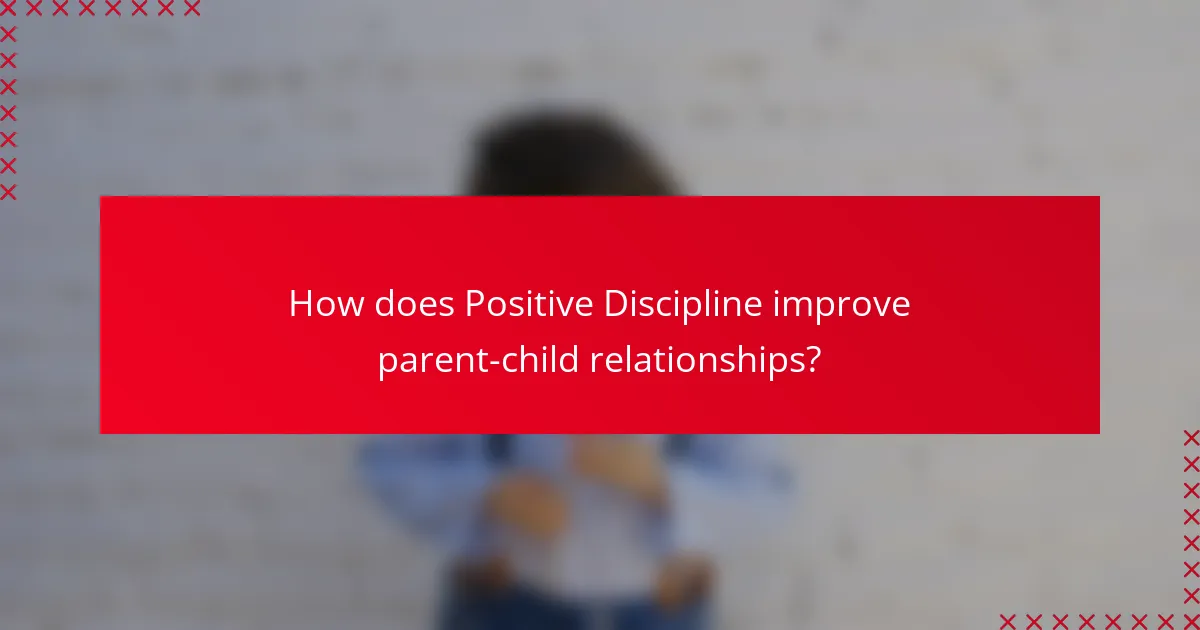
How does Positive Discipline improve parent-child relationships?
Positive Discipline enhances parent-child relationships by fostering understanding and cooperation. It encourages parents to guide their children with empathy and respect, leading to stronger emotional bonds and effective communication.
Enhances communication skills
Positive Discipline promotes open dialogue between parents and children. By using respectful language and active listening, parents can create an environment where children feel safe to express their thoughts and feelings.
For example, instead of issuing commands, parents can ask questions that encourage children to think critically about their behavior. This approach not only improves communication but also helps children articulate their emotions better.
Builds mutual respect
Mutual respect is a cornerstone of Positive Discipline. When parents treat children as equals and acknowledge their feelings, it fosters a sense of dignity and self-worth in children.
Practicing mutual respect can involve simple actions, such as validating a child’s feelings during disagreements or involving them in decision-making processes. This approach helps children learn to respect others in return, creating a harmonious family dynamic.
Promotes emotional intelligence
Positive Discipline encourages the development of emotional intelligence by teaching children to recognize and manage their emotions. Parents can model emotional regulation by demonstrating how to handle frustration or disappointment calmly.
Activities like role-playing or discussing emotions in various situations can help children understand their feelings and those of others. This skill set not only improves parent-child relationships but also prepares children for social interactions outside the home.

What are effective Positive Discipline techniques?
Effective Positive Discipline techniques focus on teaching children self-discipline and responsibility while fostering a strong parent-child relationship. These methods emphasize understanding and communication rather than punishment, helping children learn from their mistakes in a supportive environment.
Time-outs as a reflection tool
Time-outs serve as a valuable reflection tool, allowing children to pause and think about their behavior. Instead of being a punishment, this technique encourages kids to calm down and consider their actions, which can lead to better decision-making in the future.
When implementing time-outs, choose a quiet space free from distractions. Keep the duration appropriate—generally, one minute for each year of the child’s age is effective. After the time-out, engage in a discussion about what happened and how to handle similar situations differently next time.
Collaborative problem-solving
Collaborative problem-solving involves parents and children working together to find solutions to conflicts or behavioral issues. This technique empowers children by including them in the decision-making process, fostering a sense of ownership over their actions.
To practice collaborative problem-solving, start by identifying the issue together. Encourage your child to express their feelings and thoughts, then brainstorm potential solutions. Aim for a win-win outcome that respects both the child’s needs and the family’s values.
Encouragement over praise
Encouragement focuses on recognizing effort and improvement rather than simply praising results. This approach helps children develop a growth mindset, understanding that their abilities can improve with practice and perseverance.
When encouraging your child, be specific about what they did well. For example, instead of saying “Great job!”, you might say, “I really appreciate how hard you worked on that project.” This specificity reinforces positive behavior and motivates them to continue striving for improvement.
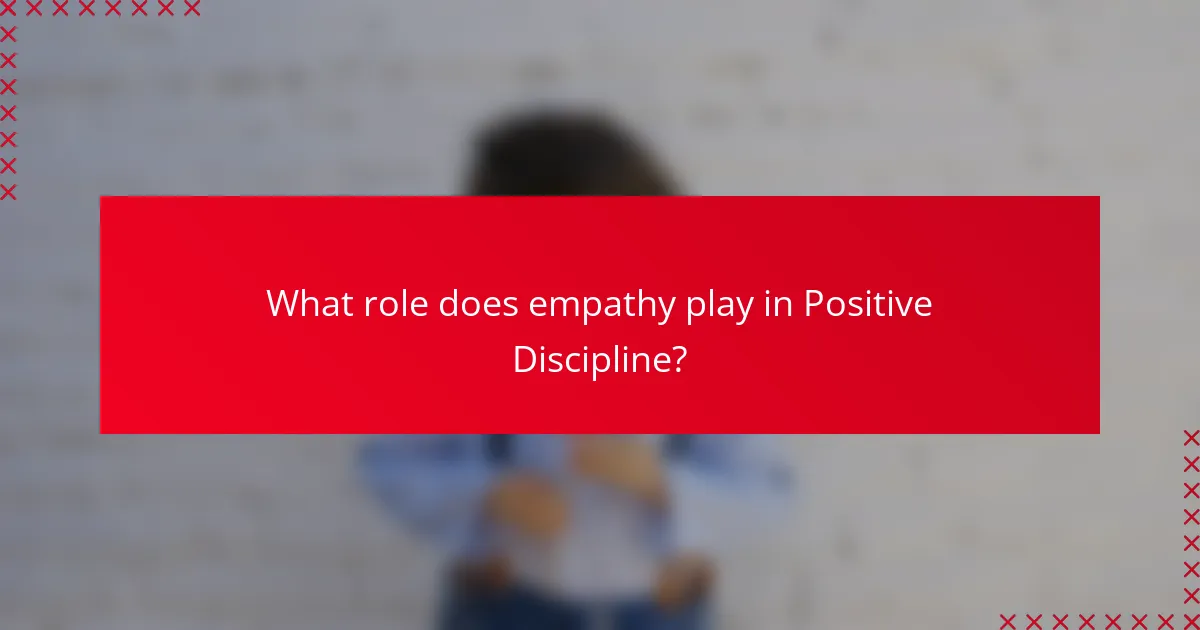
What role does empathy play in Positive Discipline?
Empathy is crucial in Positive Discipline as it helps parents connect with their children’s emotions and experiences. By understanding their child’s feelings, parents can guide behavior in a supportive manner that fosters trust and cooperation.
Fosters understanding of feelings
Empathy allows parents to recognize and validate their child’s emotions, which is essential for healthy emotional development. When children feel understood, they are more likely to express themselves openly, reducing the likelihood of behavioral issues.
For example, if a child is upset about losing a game, a parent can acknowledge their disappointment instead of dismissing it. This validation helps the child learn to manage their emotions and reinforces the parent-child bond.
Encourages perspective-taking
Empathy promotes perspective-taking, enabling children to consider others’ feelings and viewpoints. This skill is vital for developing social awareness and conflict resolution abilities, which are important throughout life.
Parents can encourage this by asking questions that prompt children to think about how others might feel in various situations. For instance, discussing how a friend might feel if they are excluded from a game can help children develop compassion and understanding.
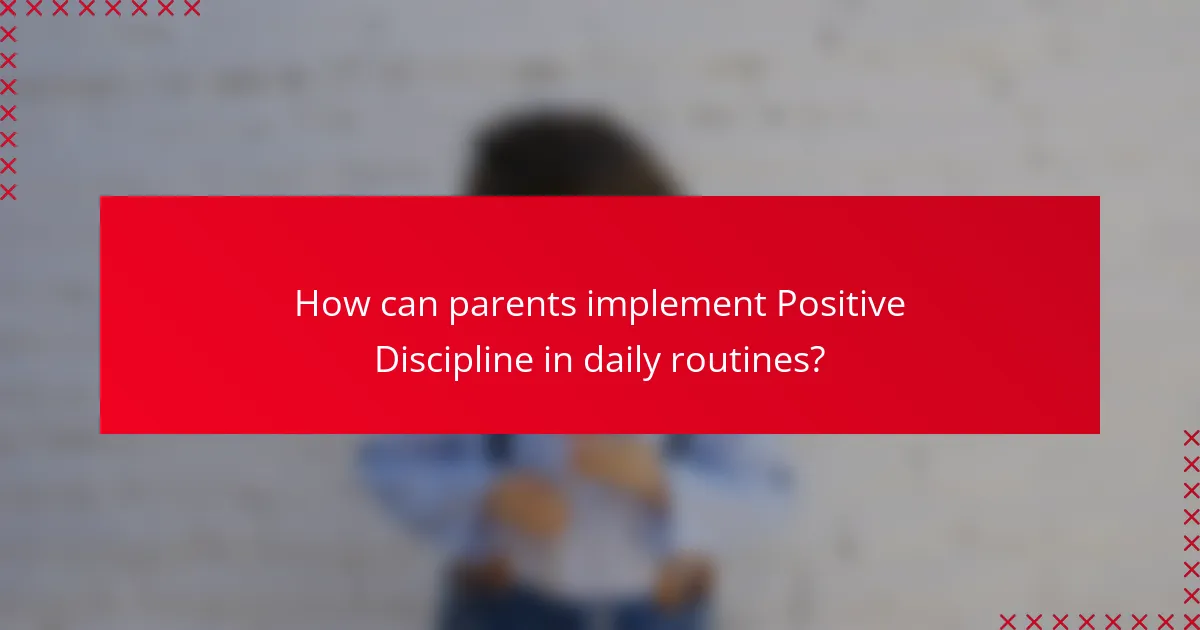
How can parents implement Positive Discipline in daily routines?
Parents can implement Positive Discipline by integrating strategies that promote mutual respect and understanding into their daily interactions. This approach emphasizes guidance over punishment, fostering a supportive environment for children to learn and grow.
Setting clear expectations
Establishing clear expectations is crucial for effective Positive Discipline. Parents should communicate rules and boundaries in a straightforward manner, ensuring that children understand what is expected of them. For example, instead of saying “be good,” specify behaviors like “use indoor voices” or “share toys with your siblings.”
It can be helpful to involve children in the process of setting these expectations. This not only empowers them but also increases their commitment to following the rules. Regularly reviewing these expectations can reinforce their importance and help children remember them.
Consistent follow-through on consequences
Consistency in applying consequences is essential for Positive Discipline to be effective. When a child breaks a rule, parents should follow through with predetermined consequences that are fair and proportional. For instance, if a child refuses to do their homework, a logical consequence might be losing screen time until the homework is completed.
It’s important to communicate the reasons behind the consequences to help children understand the connection between their actions and outcomes. This approach encourages accountability and helps children learn from their mistakes.
Modeling appropriate behavior
Parents play a vital role in modeling appropriate behavior for their children. By demonstrating respect, empathy, and problem-solving skills in their own actions, parents provide a living example for their children to emulate. For instance, showing patience when dealing with frustration teaches children how to handle their own emotions.
Engaging in open discussions about feelings and choices can further reinforce these lessons. Parents should encourage children to express their thoughts and feelings, fostering an environment where healthy communication is valued. This not only strengthens the parent-child relationship but also equips children with the skills they need to navigate social situations effectively.
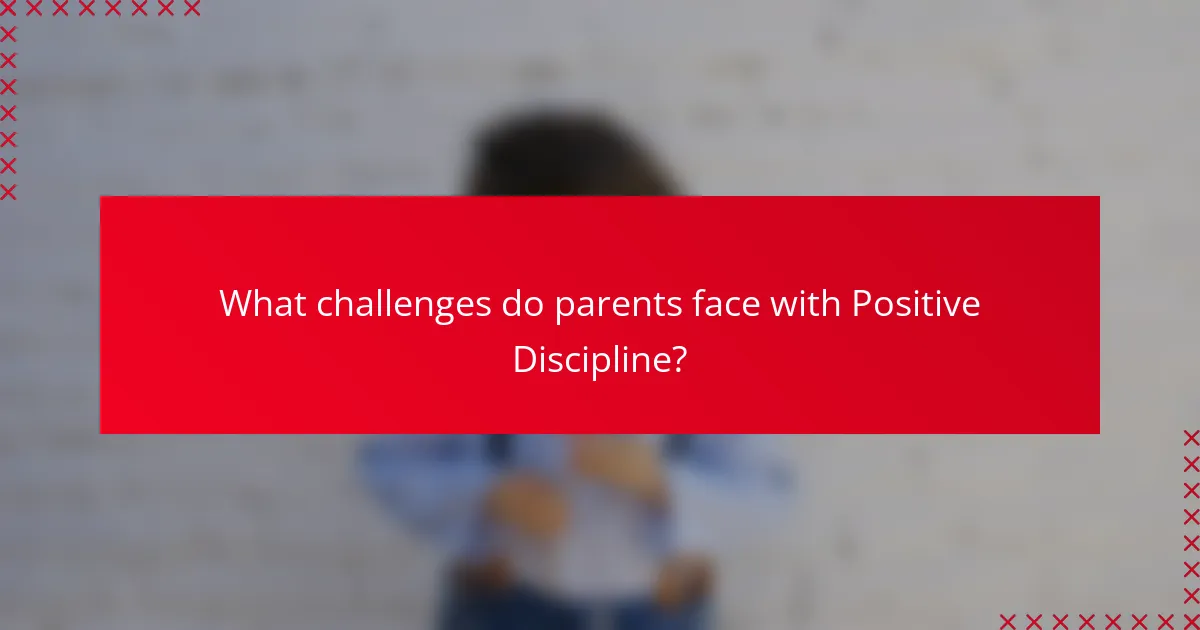
What challenges do parents face with Positive Discipline?
Parents often encounter several challenges when implementing Positive Discipline, including resistance from children and a misunderstanding of the techniques involved. These hurdles can hinder effective communication and the establishment of a nurturing environment.
Resistance from children
Children may resist Positive Discipline techniques because they are accustomed to traditional forms of discipline. This resistance can manifest as defiance, tantrums, or withdrawal, making it difficult for parents to maintain consistency. Understanding that this is a normal reaction can help parents stay patient and committed to their approach.
To mitigate resistance, parents can involve their children in discussions about rules and consequences. Encouraging children to express their feelings and opinions fosters a sense of ownership and can reduce pushback against discipline strategies.
Misunderstanding of techniques
Many parents misunderstand the principles of Positive Discipline, often confusing it with permissiveness or a lack of boundaries. This misunderstanding can lead to inconsistent application of techniques, which may confuse children and undermine the discipline process. It is crucial for parents to educate themselves on the core concepts of Positive Discipline to implement it effectively.
Parents should focus on key techniques such as setting clear expectations, using natural consequences, and fostering problem-solving skills. Workshops, books, and online resources can provide valuable insights and practical examples to help parents grasp these methods and apply them consistently.
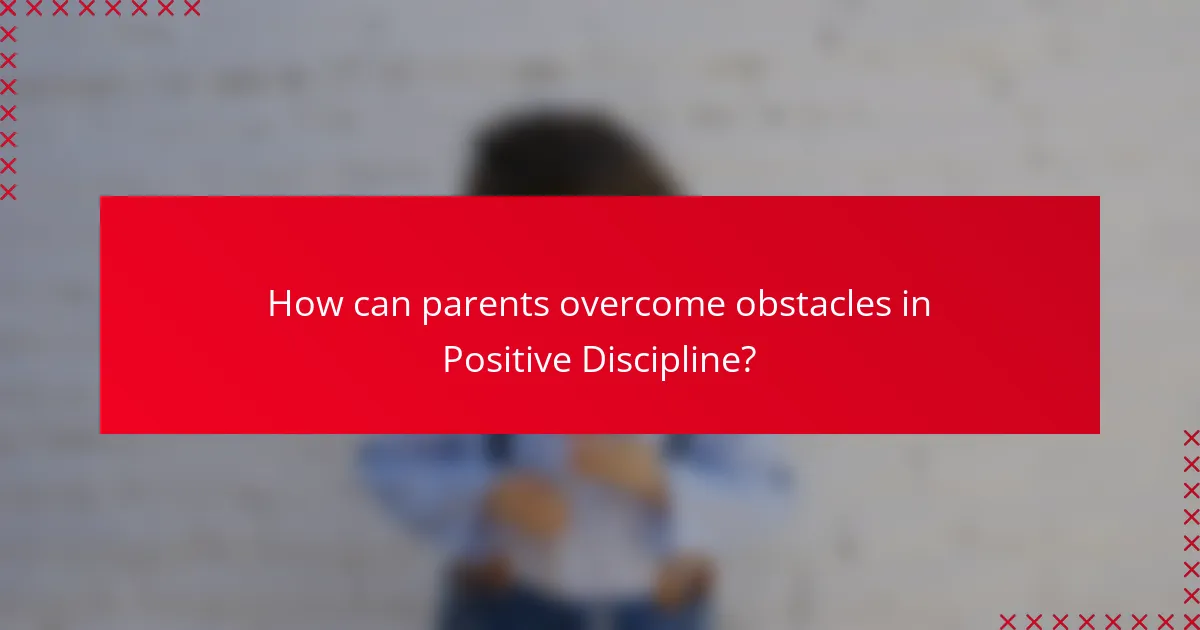
How can parents overcome obstacles in Positive Discipline?
Parents can overcome obstacles in Positive Discipline by actively seeking support and utilizing available resources. Engaging with others and accessing educational materials can provide valuable insights and strategies to enhance parent-child relationships.
Seeking support from parenting groups
Joining parenting groups can offer a sense of community and shared experience. These groups often provide a platform for parents to discuss challenges and share effective Positive Discipline techniques.
Consider local community centers or online forums where parents can connect. Regular meetings or virtual discussions can help parents feel less isolated and more empowered in their discipline approaches.
Utilizing resources like books and workshops
Books and workshops focused on Positive Discipline can equip parents with practical tools and strategies. Look for well-reviewed titles or local workshops that emphasize hands-on techniques and real-life applications.
Many resources are available online, including webinars and e-books, which can be accessed at your convenience. Aim to read a chapter or attend a session weekly to gradually integrate new practices into your parenting routine.
